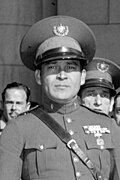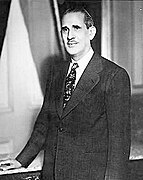
The Progressive Citizens' Party is a national-conservative political party in Liechtenstein. The FBP is one of the two major political parties in Liechtenstein, along with the Christian-democratic Patriotic Union. Founded in 1918 along with the now-defunct Christian-Social People's Party, it is the oldest extant party in Liechtenstein.

Parliamentary elections were held in Greece on 19 August 1928. The result was a victory for the Liberal Party, which won 178 of the 250 seats.
Parliamentary elections were held in Finland on 1 and 2 April 1924. Although the Social Democratic Party remained the largest in Parliament with 60 of the 200 seats, Lauri Ingman of the National Coalition Party formed a centre-right majority government in May 1924. It remained intact until the Agrarians left in November 1924. Voter turnout was 57.4%.
Parliamentary elections were held in Finland between 1 and 3 July 1933. The Social Democratic Party remained the largest party in Parliament with 78 of the 200 seats. However, Prime Minister Toivo Mikael Kivimäki of the National Progressive Party continued in office after the elections, supported by Pehr Evind Svinhufvud and quietly by most Agrarians and Social Democrats. They considered Kivimäki's right-wing government a lesser evil than political instability or an attempt by the radical right to gain power. Voter turnout was 62.2%.

Parliamentary elections were held in Iceland on 25 June 1978. The Independence Party remained the largest party in the Lower House of the Althing, winning 14 of the 40 seats. Following the election a coalition was formed between the People's Alliance, Social Democratic Party and the Progressive Party with Ólafur Jóhannesson as Prime Minister.

General elections were held in Cuba on 14 July 1940. Fulgencio Batista won the presidential election running under the People's Socialist Coalition banner, whilst the Partido Auténtico emerged as the largest party in the House of Representatives. Voter turnout was 73.4%.

General elections were held in Liechtenstein on 1 February 1970. The Patriotic Union won 8 of the 15 seats in the Landtag, the first time it had held a majority since its formation in 1936. However, it continued the coalition government with the Progressive Citizens' Party, which had been in power since 1938. Voter turnout was 94.8%, although only male citizens were allowed to vote.

Parliamentary elections were held in Bulgaria on 4 September 1911. The result was a victory for the People's Party-Progressive Liberal Party alliance, which won 190 of the 213 seats. Voter turnout was 47.2%.

General elections were held in Liechtenstein on 4 April 1939. Although a new system of proportional representation had been introduced to pacify voters at a time when the country was under threat from neighbouring Nazi Germany, it was not used and the elections became known as the "silent elections" as no actual vote was held. Instead, the governing Progressive Citizens' Party and opposition Patriotic Union formed a coalition, assigning a roughly equal number of seats each, in order to prevent the German National Movement in Liechtenstein from acquiring any seats in the Landtag.

General elections were held in Liechtenstein on 29 April 1945. Following the "silent elections" of 1939, they were the first to use the new proportional representation system. The Progressive Citizens' Party won eight of the 15 seats in the Landtag, but remained in coalition with the Patriotic Union.

General elections were held in Liechtenstein on 6 February 1949. The Progressive Citizens' Party won eight of the 15 seats in the Landtag, but remained in coalition with the Patriotic Union.

General elections were held in Liechtenstein on 15 February 1953. The Progressive Citizens' Party won eight of the 15 seats in the Landtag, but remained in coalition with the Patriotic Union. This was the first and only election contested by the Workers' and Peasants' Party.

General elections were held in Liechtenstein on 14 June 1953. The Progressive Citizens' Party won eight of the 15 seats in the Landtag, but remained in coalition with the Patriotic Union.

General elections were held in Liechtenstein on 1 September 1957. The Progressive Citizens' Party won eight of the 15 seats in the Landtag, but remained in coalition with the Patriotic Union.

General elections were held in Liechtenstein on 23 March 1958. The Progressive Citizens' Party won nine of the 15 seats in the Landtag, but remained in coalition with the Patriotic Union.

General elections were held in Liechtenstein on 25 March 1962. The Progressive Citizens' Party won eight of the 15 seats in the Landtag, but remained in coalition with the Patriotic Union. This was the first election contested by the Christian Social Party.

General elections were held in Liechtenstein on 6 February 1966. The Progressive Citizens' Party won eight of the 15 seats in the Landtag, but remained in coalition with the Patriotic Union.

The National Democratic Group was a political party in Andorra.

The Party for the Full Emancipation of the Roma of Macedonia is a political party in North Macedonia representing the Roma minority.











